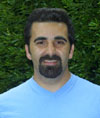Student wins national recognition for research
by Mathew DouglasPublic Relations
Of the thousands who await a liver transplant, less than a third will receive that one organ they desperately need to survive.
M.D./Ph.D. student Stephen Faraz Shafizadeh's research promises to improve those odds. His research caught the eye of investigators at local, regional and national levels where he has received recognition by winning several prestigious awards.
 Stephen
Faraz Shafizadeh
Stephen
Faraz Shafizadeh
Shafizadeh recently received the American Transplant Congress’ Young Investigator Award as well as the Gift of Life Scholarship. Also, he won first place in the biochemistry and genetics category at The National Student Research Forum in Texas. In Miami, at the Eastern Student Research Forum, Shafizadeh received three more honors as best overall, clinical, and surgical research.
Shafizadeh has also been the recipient of the Chrysallis Project Award from the American Academy of Allergy Asthma and Immunology. These regional and national awards were preceded by local recognition as well. Shafizadeh won first place twice at Student Research Day here at MUSC, first place at the Student Statewide Research Competition on Molecular Approaches to Biological Problems, and first place in research from the South Carolina Medical Association. “These awards are not individual achievements,” Shafizadeh said. “They are the result of a group effort, namely, Carmen Polito, Ryan Fiorini, Kathy Haines, and Dr. Gang Cheng, all of whom work under the direction and guidance of Drs. Michael Schmidt and Kenneth Chavin.”
In Chavin's laboratory in the Division of Transplant Surgery, Department of Surgery, Shafizadeh conducts research on mice with normal and fatty (steatotic) livers. Mice with fatty livers are globally obese due to a spontaneous mutation in the leptin gene. Human liver steatosis is frequently a result of obesity, but can occur from diabetes or alcohol abuse or can be idiopathic.
Steatotic livers are currently deemed “untransplantable” due to their prohibitive rate of developing primary non-function. Shafizadeh hopes that his translational research will ultimately allow fatty livers to be used for transplantation.
“Increasingly, our nation suffers from an organ shortage for transplantation,” Shafizadeh said. “If we can somehow find a way to use these steatotic livers for transplantation, a third more people would receive the liver transplant they desperately need, which translates into saving people's lives.” Success could result in a 30 percent increase in the number of viable livers for transplantation.
Chavin and Shafizadeh are attacking this organ shortage problem from at least three fronts. “The aim is to disassemble the causative factors involved in graft failure of fatty livers to hopefully develop a cocktail of therapies. Now, we are investigating these measures individually on mice,” Shafizadeh said. One method involves injecting these fatty mice with a drug called Cerulenin, an inhibitor of fatty acid synthase B an enzyme which is part of the process of metabolizing fats in the liver.
“Less than 25 percent of the fatty mice survive hepatic ischemia-reperfusion. However with cerulenin treatment this prohibitive mortality is reversed to more than 95 percent survival,” said Shafizadeh. Two other areas currently under investigation are using monoclonal antibodies against endotoxin and antioxidants to improve survival rates of fatty mice undergoing this operation. Shafizadeh recently presented his work as a Young Investigator in Washington, D.C. at the 2003 American Transplant Congress in June.
“This is exactly the kind of research the Medical University is so excited in supporting its students to conduct,” said Victor Del Bene, M.D., associate dean for students in the College of Medicine.
“The research that Stephen has been conducting in Dr. Chavin's laboratory exemplifies the approach that many of our MD/PhD students take. They are conducting high quality research with the potential to be translated into a better understanding of a pathophysiologic process or into new or improved therapeutic approaches” said Perry Halushka, M.D., Ph.D., director of the Medical Scientist Training Program.
Shafizadeh will graduate from MUSC with both M.D. and Ph.D. degrees in 2005. After graduation he plans to pursue a surgical residency. Shafizadeh thanks Fred Crawford, M.D., Prabahkar Baliga, M.D., Halushka, Del Bene, Lucille London, Ph.D., and especially Chavin, his mentor, for giving him the opportunity five years ago to pursue his academic interests and conduct research that he hopes will translate into saving human lives.
Shafizadeh said he believes in service to and the oneness of humanity and works for racial, gender, and health equality. He assists in the coordination of a mentoring program for underprivileged children and youth.
He said his ultimate aim is to amalgamate his traditional and alternative
medicine background with the social and spiritual tenets of the Bahá'í
Faith into the establishment of centers of healing in the United States,
and especially in developing countries, for the advancement of the mind,
body, and soul.
Catalyst Online is published weekly, updated as
needed and improved from time to time by the MUSC Office of Public Relations
for the faculty, employees and students of the Medical University of South
Carolina. Catalyst Online editor, Kim Draughn, can be reached at 792-4107
or by email, catalyst@musc.edu. Editorial copy can be submitted to Catalyst
Online and to The Catalyst in print by fax, 792-6723, or by email to petersnd@musc.edu
or catalyst@musc.edu. To place an ad in The Catalyst hardcopy, call Community
Press at 849-1778.